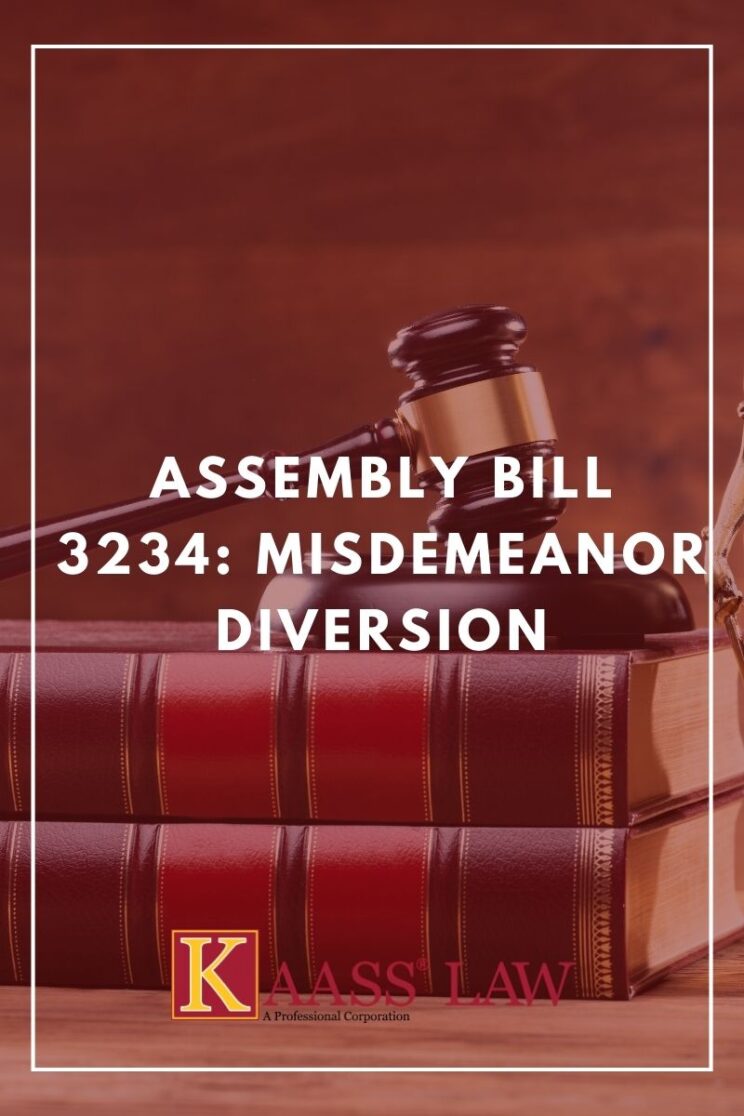What is Assembly Bill 3234?
Assembly bill (AB) 3234 is a bill that was approved by the governor of California on September 30, 2020, which allows a judge to offer diversion on a criminal misdemeanor charge. This is similar to the existing law that expired in 2018. However, this new law allows a judge to consider diversion on misdemeanors charges not eligible under the prior law.
When does Assembly Bill 3234 Become Effective?
AB 3234 took effect on January 1, 2021.
What Kind of Diversions Exist on Criminal Matters?
Both informal and formal diversions exist on criminal matters.
What is a Formal Diversion?
In a criminal case, formal diversion occurs when the court provides the defendant the opportunity to complete terms of their probation. If the defendant successfully completes the terms of probation, the court dismisses the charges. However, the defendant may have to plead guilty to the crime they have been accused of.
What is an Informal Diversion?
Alternatively, an informal diversion continues a criminal case for the probationary period without entering any plea. The court requires the defendant to fulfill obligations during their probationary period. Should the defendant fulfill their obligations, the case will be dismissed.
What does Assembly Bill 3234 Allow?
Assembly bill 3234 allows a judge to do the following, even if objected to by the prosecuting agency:
- Offer diversion to the defendant, should their case qualify for a diversion;
- Allow the case to continue for up to 24 months, should the defendant wish to accept the diversion
What Misdemeanor Charges Qualify for Diversion Under Assembly Bill 3234?
The following types of misdemeanor charges qualify under Assembly Bill 3234:
- Nonviolent drug violations;
- Traffic violations
What is Considered a Violent Offense?
Violent offenses include charges such as those for child abuse, domestic violence, domestic abuse, felony assault, assault with a deadly weapon, murder, and arson. Thus, the law considers these charges serious and excludes them from qualifying for diversion.
What Misdemeanor Charges Do Not Qualify for Diversion Under Assembly Bill 3234?
The following misdemeanor charges do not qualify for diversion under Assembly Bill 3234;
- Offenses that requires sex registration as per PC 290;
- Domestic violence as per PC 273.5(a);
- Sexual battery as per PC 243.4(e)(1);
- Stalking laws as per PC 646.9
What Other Changes Are Associated with Assembly Bill 3234?
Another change associated with the passing of AB 3234 is that now individuals are eligible for the Elderly Parole Program at the age of 50 rather than 60 years old. This would apply after a minimum of 20 years of continuous incarceration rather than 25 years of continuous incarceration.
Los Angeles Criminal Defense Attorney
If you or someone you know has been charged with a misdemeanor that may qualify for a diversion, contact KAASS LAW at (310) 943-1171 for a free consultation. Our attorneys will evaluate the details of your case and let you know what to expect and how you can proceed.
Benefits of Diversion under Assembly Bill 3234
Assembly Bill 3234 offers significant benefits to those facing criminal charges for the crime of sabotage. A diversion program allows a defendant to avoid criminal penalties and have a chance at rehabilitation. But only if certain conditions are met. Participation in the program can significantly improve a defendant’s future. Especially when it comes to low-level offenses.
What are The Requirements to Participate in Diversion?
In order for a defendant to qualify for diversion, his or her case must meet a number of requirements.
1. The offense must be a misdemeanor. It must not involve violence. For example, it could be a misdemeanor drug offense or a traffic violation.
2. The defendant must agree to the terms of the program. For example: perform community service, participate in substance abuse treatment programs.
Length and Conditions of the Diversion Program
Under Assembly Bill 3234, the court can give the defendant up to 24 months to comply with the terms of the program. This gives the defendant an opportunity to:
- Work on themselves
- Overcome problems associated with the offense
- Successfully complete the program, resulting in the dismissal of the charges
Conclusion
Assembly Bill 3234 provides important options for people facing low-level offenses. They can choose a diversion program and avoid serious consequences to their lives. However, the program is only available to those whose crimes are non-violent and serious. If you or a loved one is facing charges that may qualify for diversion under this law, contact KAASS LAW. our attorneys can evaluate your situation and offer the best possible solution. Call us at 844-522-7752 for a free consultation.

